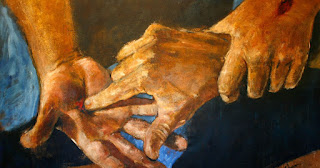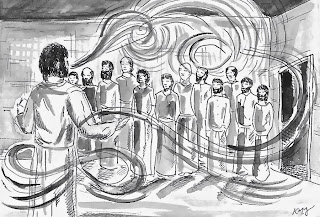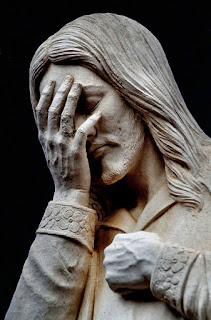Thomas, one of Jesus’ disciples, is not there, in that
locked room, when Jesus first appears to his friends again after his
resurrection. We don’t know why. Was Thomas too dejected and hurting even to
bear the company of his friends? Was he so disillusioned by watching Jesus’
crucifixion that he’d given up keeping company with a group now united by
nothing save a disgraced and dead leader? We don’t know. But he is not there
and so he misses the awe-ful encounter with the risen Jesus.
He’s told about it, of course, but he simply cannot
believe it to be true: “Unless I see the nail marks in his hands and put my
finger where the nails were, and put my hand into his side, I will not believe.”
(John 20:25)
Thomas wants evidence. He wants proof. But,
interestingly, what he wants proof of, in some sense, is not only Jesus’
resurrection, but his suffering. Thomas does not simply want a risen Saviour;
he wants a risen Saviour who still bears the marks of his sacrifice. He wants
to know that this man who the others claim to be Jesus really is Jesus. And the
only way he can really be Jesus is if he really did die. If he really was
beaten and whipped and humiliated, if he really did have a soldier’s spear
pierced through his side (John 19:34). If he really was nailed to a cross.
When Jesus does appear to Thomas a week later (20:26), he
goes straight over to his friend and offers him his wounds: “Put your finger
here; see my hands. Reach out your hand and out it in my side. Stop doubting
and believe.” (20:27)
It is strange, really, that Jesus should have scars. It
is strange and it is also a deliberate choice. God could, of course, have given
Jesus a perfected resurrection body that was wound-free. Instead, although this
is a perfected resurrection body, the
wounds it bears are not seen to be in conflict with its perfection or its
beauty. In some sense, Jesus’ woundedness is part of his glory; it is necessary
to it.
In Revelation, when John – the same John writing this
account of Jesus’ resurrection appearance – sees a vision of Jesus in heaven
with God, the Father, he is described as “a Lamb, looking as though it had been
slain” (Revelation 5:6). This slain lamb is now the centrepiece of heaven, the
one who every creature bows down before. The risen, ascended King of Kings
looks like a murdered lamb. Even in heaven, Jesus bears the marks of his brutal
slaughter.
At a time like this one, when we are surrounded by pain
and suffering and death; a time when our hearts are grieved and hurting, when
we mourn the loss of friends and family, I do not think I could worship a God
who was not wounded. I could not worship a God who did not understand pain and
suffering, who had not entered into everything it means to be human, even the
awful bits, the uncomfortable bits, the very worst moments felt by the human
heart, and endured by the human body.
In her astonishing book, “The Crucifixion”, Fleming
Rutledge asks the question of why Jesus was crucified. Not only the question of
why did Jesus die, but why that death, why crucifixion. Her book is beautiful
and dense and complex and she does not offer an easy or simple answer to that
question, because it is a question that has many answers. But, in one
particular chapter, she talks about the godlessness of the cross, the scandal
of it, the sheer unthinkable-ness of a God who allows himself to be murdered
and shamed and strung up on a cross. She says this:
“This was the destiny chosen by the Creator and Lord of
the universe: the death of a nobody.
He was despised and rejected by men…
As one from whom men hide their
faces
He was despised, and we esteemed
him not. (Isaiah 53:3)
Thus the Son of God entered into solidarity with the
lowest and least of all creation, the nameless and forgotten.” (The
Crucifixion, p.92)
I cannot really get my head around this. But as I read
the news, as I hear stories of people dying all alone cut off from loved ones,
of nurses being forced to work in intolerable and frightening conditions, of care
homes being decimated by covid19, I find comfort in the wounds of Jesus. Wounds
that he will have for all eternity, wounds that mark not only what he bore for us, but his solidarity with us.
Jesus is a “man of suffering, familiar with pain” (Isaiah
53:3). He knows pain, he endured it, and he will forever bear the marks of what
it did to him.





